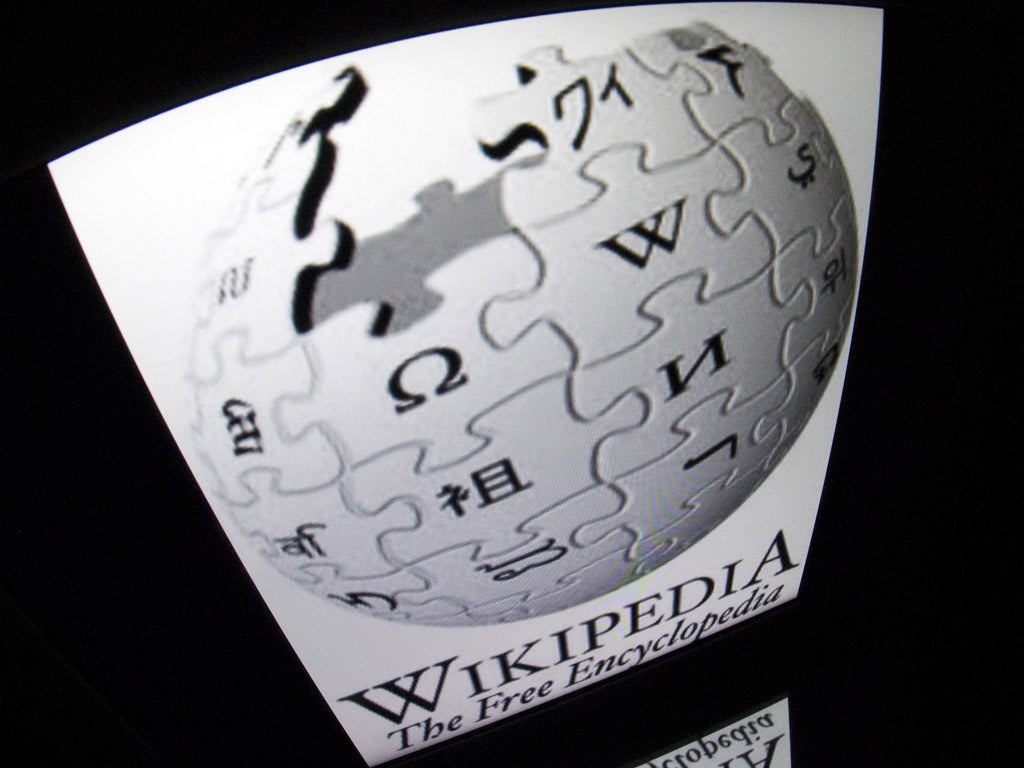Wikipedia names Texas PR firm over false manipulation of site entries
Free encyclopaedia called in lawyers after 300 'sock puppet' accounts were traced to single firm

Your support helps us to tell the story
From reproductive rights to climate change to Big Tech, The Independent is on the ground when the story is developing. Whether it's investigating the financials of Elon Musk's pro-Trump PAC or producing our latest documentary, 'The A Word', which shines a light on the American women fighting for reproductive rights, we know how important it is to parse out the facts from the messaging.
At such a critical moment in US history, we need reporters on the ground. Your donation allows us to keep sending journalists to speak to both sides of the story.
The Independent is trusted by Americans across the entire political spectrum. And unlike many other quality news outlets, we choose not to lock Americans out of our reporting and analysis with paywalls. We believe quality journalism should be available to everyone, paid for by those who can afford it.
Your support makes all the difference.Wikipedia has named and shamed a Texas-based public relations company following an investigation into spin doctors and "sock puppets" falsely manipulating entries on the site.
The free encyclopaedia, which contains more than 30 million volunteer-authored articles in nearly 290 languages, called in lawyers after discovering that 300 "sock puppet" accounts - created using false identities - could be traced to a single public relations firm.
Matthew Roth, a spokesperson for the Wikimedia Foundation, the charitable organisation which is responsible for the site, said that Texas company Wiki-PR had been served with a legal letter warning it to "cease and desist" from editing sites. The PR company was also accused of the practice of "meatpuppetry", where a user with a false identity is invited into an online discussion simply to support the argument of the invitee.
In a letter from its lawyers, Cooley LLP, the foundation warned Wiki-PR: "We have come to the opinion that, based on the evidence we have to date, that agent(s) of your company have engaged in sockpuppetry or meatpuppetry to, among other things, make it appear as if certain articles are written by unbiased sources when in fact those articles are authored by Wiki-PR for money."
The Wikimedia Foundation announced an investigation into false editing of its pages for money in October. In a statement at that time, Sue Gardner, executive director of the Wikimedia Foundation, acknowledged that it had been the victim of concerted activity in falsifying pages for commercial and other motives. "It looks like a number of user accounts - perhaps as many as several hundred - may have been paid to write articles on Wikipedia promoting organisations or products," she said, "and have been violating numerous site policies and guidelines."
The foundation banned or blocked some 250 sock puppet accounts. "Our goal is to provide neutral, reliable information for our readers, and anything that threatens that is a serious problem," Ms Gardner added.
The scandal has been damaging to the credibility of Wikipedia, which was launched in 2001 by Jimmy Wales and Larry Sanger. Rumours of co-ordinated sockpuppetry began with stories online such as The Daily Dot's "The battle to destroy Wikipedia's biggest sockpuppet army" and Vice's "Is the PR Industry Buying Influence Over Wikipedia?"
During the Wikimedia Foundation investigation a ban was placed on Wiki-PR but the foundation's lawyers claim that the PR firm continued to offer to edit accounts for paying clients. "You admitted that Wiki-PR has continued to actively market paid advocacy editing services despite the ban - consistent with evidence that we have discovered independently."
The warning to Wiki-PR - which threatens further legal action against the PR firm - claims that sockpuppetry and similar practices are an abuse of the goodwill and work of Wikipedia's vast army of volunteers.
"The Wikimedia community of volunteer writers, editors, photographers, and other contributors has built Wikipedia into the world's most popular encyclopaedia, with a reputation for transparency, objectivity and lack of bias. When outside publicity firms and their agents conceal or misrepresent their identity by creating or allowing false, unauthorized or misleading user accounts, Wikipedia's reputation is harmed," it said.
"By seeking to gain a commercial benefit from the Wikipedia brand, these publicity firms are attempting to profit from the substantial time and effort invested by the Wikipedia volunteer community."
A spokesperson said:"Wiki-PR is working with the Wikimedia foundation and its counsel to sort this out."
A Wikimedia Foundation spokesman said: "The Wikimedia Foundation has communicated with Wiki-PR, but we reject any implication that we are negotiating with them. As stated in the cease and desist letter, Wiki-PR has been banned by the Wikipedia community, and must cease editing until it fully complies with the terms and conditions outlined by the Wikipedia community. Because of this, if Wiki-PR wishes to continue editing, they should talk with the Wikipedia community."
Two years ago the former Independent columnist Johann Hari issued a personal apology after admitting to sockpuppetry on the Wikipedia accounts of rival writers.
Join our commenting forum
Join thought-provoking conversations, follow other Independent readers and see their replies
Comments